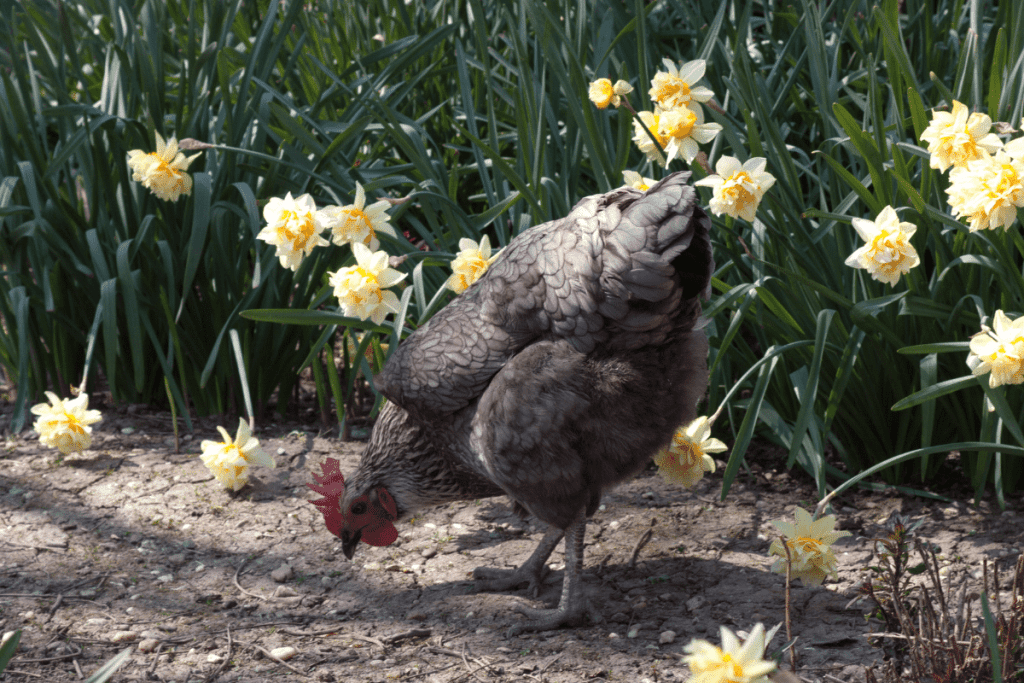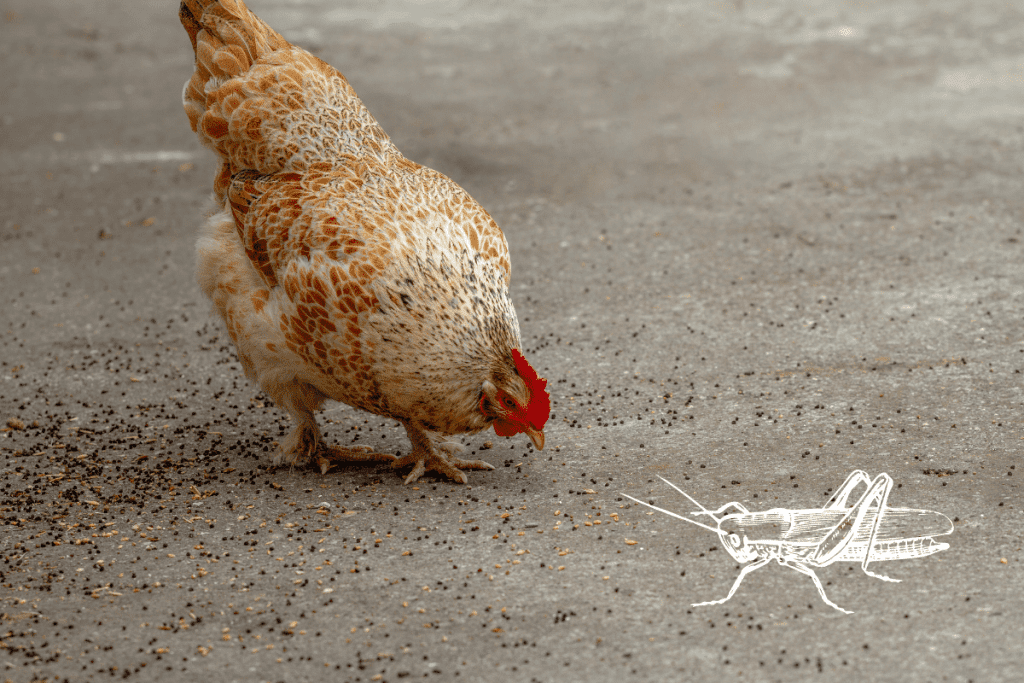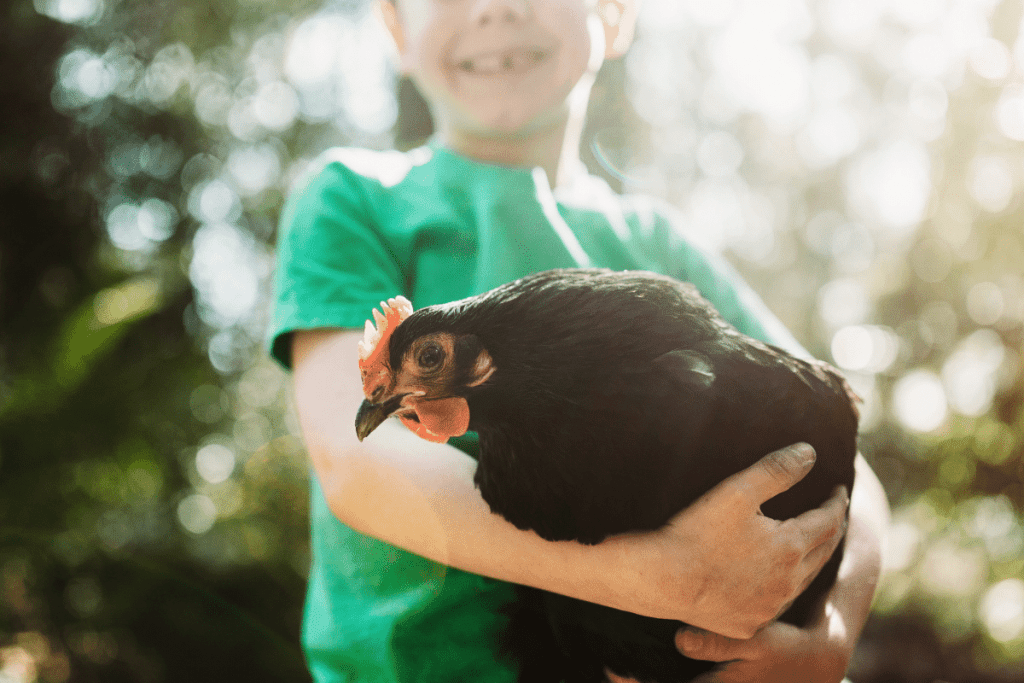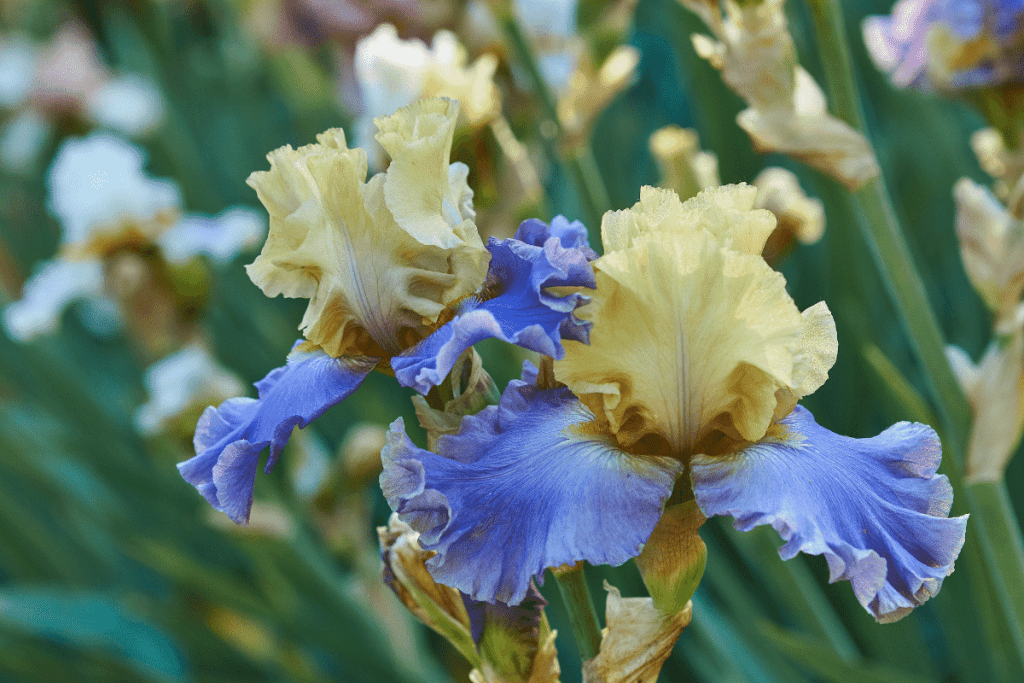Chickens are known for pecking and scratching at the dirt, taking dust baths, and foraging for food wherever plants are growing.
If you have a flower bed, keeping backyard chickens may present a challenge.
Raising chickens has become more prevalent in urban areas, chicken owners have been seeking solutions to keep their beloved farm animals from destroying their flowers.
Keep reading for our list of 14 ways to keep chickens out of your flower beds.

Table of Contents
ToggleUse Landscaping In and Around Your Garden
Planting shrubs around your garden is an attractive solution for a natural chicken repellent.
Chickens will have difficulty going through dense shrubbery, so they will not be able to get into your flower bed.
There are many shrubs to choose from, and many of them produce lovely flowers.
However, avoid planting holly, yew, or azalea bushes, as the berries and blooms of these shrubs are very toxic to chickens if they are ingested.
Landscaping with rocks in or around your flower garden is another method to keep chickens from destroying your flowers.
Use large rocks, as chickens will peck at small gravel or pebbles and possibly ingest them.
Bricks may also be used as an attractive border around your flower bed, or you may place them in the garden itself.
Covering exposed soil with bricks or rocks will deter your chickens by reducing areas for them to peck for bugs or kick up dirt.
Placing bricks or rocks in the flower bed will also lessen the amount of dust in your garden.
When using bricks or rocks as ground cover, space them far enough apart for your plants to grow and thrive.
Creating raised flower beds will also make it difficult for chickens to get to your flowers, although it requires more planning and effort.
Raised gardens are usually 10 to 12” inches tall, and they have either a wooden or galvanized steel border, which is excellent for keeping chickens out.
A taller raised garden bed, such as this one, is over 2’ feet tall and costs around $50.
If your flower bed is tall enough, your chickens will not even notice your flowers.
Keep the Chicken Coop Away From Your Garden
A simple way to keep chickens out of your garden is to place their coop as far away as possible from your flower bed.
While this may not be feasible if you have a small yard, it is a very effective method if you have the extra space.
Keeping the chicken coop several feet away from your garden will deter the chickens from going near your flowers because they do not like to stray too far from the enclosure.
There are also a couple of other factors to consider when it comes to the placement of the chicken coop.
The chicken coop needs to be placed in an area with both sun and shade.
Placing the coop in full sunlight will cause your chickens to be too hot in the summer months.
If the coop is only in the shade, your chickens may get too cold during the winter.
It is also important to check local ordinances before deciding where to put your chicken coop.
Some cities have laws stating the chicken coop has to be at least 10’ feet away from your house.
Having an area around the coop for the chickens to forage will prevent them from straying into your flower bed.
Get Rid of Tasty Bugs

Reducing the number of bugs in your garden will deter your chickens from bothering your flowers.
Bugs are prevalent wherever there are flowers, and chickens enjoy many of them as snacks, including:
- Grasshoppers
- Hookworms
- Centipedes
- Ticks
- Slugs
- Spiders
- Ants
- Termites
Getting rid of bugs in your flower bed may be challenging, as you will want to avoid using any toxic insecticides for the safety of your chickens.
There are many natural methods for repelling bugs, and some are also safe for your chickens, such as:
- Vegetable oil
- Mild dish soap
- Neem oil
- Diatomaceous earth
Vegetable oil is usually made into a spray by diluting it with a mild soap.
To create a spray, dish soap and neem oil must also be diluted with water.
Diatomaceous earth is sprinkled onto the plant leaves or the soil around the plants, and it completely disrupts the life cycle of an insect.
Take care when using diatomaceous earth, as it is harmful to all insects, including beneficial pollinators like bees and butterflies.
There are also several bug-deterring plants you may choose to plant in your garden.
Lavender has a pleasant fragrance and repels mosquitoes, fleas, moths, and flies.
Basil, thyme, and mint are also very effective at repelling mosquitoes, but mint has a tendency to spread quickly, so plant it in pots to prevent it from overtaking your garden.
Alliums have large purple flowers, and their scent repels aphids, slugs, and cabbage worms.
Chrysanthemums, marigolds, and petunias are very popular garden flowers, and they prevent infestations of aphids, Japanese beetles, hornworms, and cockroaches.
Get a Guard Dog
A well-trained dog will not only guard your flower bed but will also protect your chickens.
The dog you choose is also important since not all dogs do well with chickens.
Some dog breeds have a higher prey drive than others, meaning their instinct is to hunt and kill small animals.
Dog breeds with a high prey drive include Greyhounds, Weimaraners, Jack Russell Terriers, and Siberian Huskies.
Breeds such as the Puli, Schnauzer, Golden Retriever, and Boxer may also have a high prey drive, but they were developed as farm dogs to keep rats away.
These breeds may be trained to protect your chickens, but supervision is recommended.
Other livestock herding dog breeds like the Great Pyrenees, Akbash, Border Collie, Welsh Corgi, and Anatolian Shepherd are specifically bred to protect and herd farm animals.
They are less likely to harm your chickens.
Check out our list of the best dogs who get along with chickens.
One downside to acquiring a herding dog is the high amount of exercise they require.
Herding dogs are not typically kept as pets because they guard the livestock and have more energy than an average house pet.
If you decide to get a dog to protect your flower bed and your chickens, a puppy will more easily adapt to being friendly with your chickens and less likely to attack them.
You will have to spend a lot of time training your dog properly, so consider this before choosing this method of keeping chickens out of your garden.
Install a Motion Sensor Sprinkler
A motion sensor sprinkler system is another simple method of keeping your chickens out of your flower bed.
Motion sensor sprinklers are easy to install, and instead of being set on a timer, they spray water whenever they detect movement in the area.
This sudden burst of water will startle a chicken, and the bird will think twice before roaming into your flower bed again.
A motion sensor sprinkler like this one is inexpensive at less than $50 and connects easily to your existing sprinkler system or garden hose.
The sprinkler uses an infrared sensor to detect movement up to 100’ feet away and has a spray range of up to 35’ feet.
Be sure to place your motion sensor sprinkler away from high traffic areas like your sidewalk or driveway to prevent it from constantly being set off.
It is also recommended to warn children or visitors to your home about the sprinkler to prevent any unwanted surprises for them.
Guard the Flower Bed

If you have spare time, you may choose to guard your flower bed yourself.
While this method is not the most ideal, it is very effective at keeping the chickens out of your garden.
If you let your chickens have free range time during the day, it is easy to grab a chair and sit near your flower bed to guard it.
A spray bottle of water will also help keep the chickens away from your flowers.
You may divide this time guarding the flower bed among other family members to break up the monotony.
This is also a great time to spend bonding with your chickens.
Bringing treats will keep them more interested in you than in your flower garden.
Your chickens may eventually learn to avoid your garden entirely if you are there to keep them away regularly.
Place a Fence Around Your Flower Bed
Consider building a fence around your flower bed to keep the chickens out of it.
Chickens are not adept at flying, but you may want to clip their wings if you have younger or more adventurous chickens.
You only have to clip one wing to make it more difficult for the chicken to get high enough off the ground to scale the fence.
To make the fence more effective, there are several ways to ensure your chickens cannot get into the garden.
Since chickens can fly up to 3’ feet into the air, ensure the fence is at least 4’ feet tall.
Making the top of the fence slightly unstable will ensure your chickens will be less likely to fly up and perch on top of it.
Install an inexpensive electric fence if your chickens are still finding their way past the fence and into your flower bed.
Ensure the voltage of an electric fence is within a safe range by setting it very low.
You only want to give your chickens a slight shock, not cause them any severe pain.
Electric fences are not always effective against chickens due to the lack of direct contact with their skin.
Usually, when a chicken touches an electric fence, only its feathers touch it, and they will not be shocked.
If a fence around your flower bed is not feasible, build a fence around the area designated for the chicken run.
When building a chicken fence, always give your chickens plenty of space to run freely, as they need lots of exercise.
Plant the Chickens Their Own Flower Bed
Creating a separate garden near the coop is another great way to keep your chickens out of your flower bed.
There are a variety of herbs, vegetables, and flowers your chickens will enjoy grazing, and the plants will also offer your birds nutritional value.
Herbs such as basil, sage, thyme, and oregano have medicinal properties beneficial to chickens.
Parsley is a good source of vitamin K and is known to be a stimulant for laying hens.
Cucumbers, corn, garlic, pumpkins, kale, and peas are all safe vegetables for chickens, and they provide several essential nutrients.
You will need to break open pumpkins for your chickens to be able to eat them, but once you do, they will happily eat every part of the nutritious vegetable.
Flowering plants like dandelions, white clover, amaranth, and nasturtiums are easy to grow and hardy enough to withstand being trampled and nibbled on by your chickens.
These flowering plants provide chickens with a source of healthy carbohydrates, protein, and omega-3 fatty acids.
The seeds and flowers of the nasturtium also contain a natural dewormer.
While chickens will usually stay away from plants they know are poisonous to them, it is best to avoid planting anything toxic in or around your chicken garden.
Some toxic plants to avoid include:
- Daffodils
- Nightshade plants (tomatoes, eggplants, potatoes)
- Hydrangea
- Rhododendrons
- Tulips
- Honeysuckle
- Rhubarb
Always do your research before adding a plant to ensure it is not harmful to your chickens.
In addition to plenty of nutritious plants, providing your chickens with water, shade, and areas for dust baths will keep them away from your flower bed.
Check out our list of safe plants for chickens.
Plant Flowers Chickens Do Not Like

To make your flower bed unappealing to your chickens, plant flowers they do not like.
Chickens do not enjoy certain smells, and they will avoid plants like lavender, mint, and anything with a citrus scent such as lemon thyme or lemongrass.
As a bonus, many of these fragrant plants also repel insects.
With fewer bugs in your flower bed, your chickens are even less likely to venture into it looking for a tasty snack.
Some common ornamental flowering plants chickens tend to avoid include:
- Calla lilies
- Bearded Irises
- Petunias
- Freesia
- Salvia
- Camelias
- Lantana
Chickens are also not attracted to ferns, such as the asparagus fern and foxtail fern.
Many chickens do not like marigolds, which are also known for keeping insects away.
However, some chickens do not mind eating marigolds, so they are not completely chicken-proof.
You may need to experiment with different plants to find the ones your chickens do not find tasty.
If you are unsure if your chickens find certain plants appealing, place a potted plant where your hens have access to it.
If the chickens ignore the plant, it is more likely to be safe when planted in your flower bed.
As a general rule, chickens will forage for whatever is available if they are not adequately fed.
Use Animal-Safe Repellent Devices
Installing an animal-safe repellent device will keep chickens out of your garden and prevent possible predators such as raccoons and dogs from attacking your flock.
Most of these devices have heat or motion sensors, which activate whenever a small animal is nearby.
A wireless device has the best portability and will allow you to experiment with the best placement near your flower bed.
Devices with bright flashing lights are effective against chickens, and they will emit red light to startle the animals.
There are also noise devices, which emit a high-pitched noise to scare animals away.
Some noise devices will allow you to record a specific sound to startle your chickens.
However, noise devices are not always ideal, as their sound could become bothersome to you or your neighbors if they are constantly being set off.
If flashing lights or loud noises are an issue, use a predator decoy of an owl or hawk instead.
Chickens are afraid of large predators, and a realistic statue of an owl or hawk will scare them away.
Predator decoys are less expensive than flashing light or noise devices
An owl decoy like this one may be purchased for less than $30, while other types of repellent devices cost up to $100.
A scarecrow may also keep chickens out of your flower bed, but they tend to be less effective than a predator decoy.
Use Spices or Citrus Peels to Repel Chickens
Placing spices or citrus peels around the perimeter of your flower bed is another effective way to keep your chickens away, and they may also repel certain insects.
Chickens will avoid the smell of certain spices and any kind of citrus-smelling plant.
Placing citrus rinds or juice in and around your garden is an inexpensive way to keep your chickens out, and it will also repel mosquitoes and other insects.
You may use lemon, lime, or orange peels and the juice from these fruits.
If you use citrus juice, you will have to add more every time it rains because it will be washed away.
Dried chili peppers may also be used in the same way, and they will keep moles, chipmunks, raccoons, and dogs out of your garden.
Since citrus peels and dried chili peppers could give an unsightly appearance to your garden, you may use ground spices as a less visible option.
Common spices chickens and other animals are not fond of include paprika, cinnamon, cayenne, and curry powder.
Salt is also a chicken repellent, but it will possibly interfere with plant growth by altering the composition of your soil.
Sprinkle the spices on the soil and plant leaves for an easy way to keep chickens away from your flowers.
Install Chicken Wire or Hardware Cloth
Chicken wire fencing is commonly placed around chicken coops to keep them contained and protect them from predators.
You may also use chicken wire to create a cage around your plants to prevent chickens from pecking at them.
While it is not the most attractive solution for keeping chickens away, it is effective and gives climbing plants something to attach to.
Hardware cloth may be used as an alternative to chicken wire, and it is typically more durable and has smaller openings.
In addition to using hardware cloth to create fencing or cages, it may also be used as ground cover to protect emerging seedlings.
Use metal shears to cut the hardware cloth large enough to cover your seedlings, leaving extra on the sides.
Snip the corners, fold the sides down to create a box, tie the corners together with twine, and place the completed box over your seedlings.
The hardware cloth box will give your seedlings room to sprout while protecting them from your chickens.
Use A Chicken Tractor
A chicken tractor is a portable chicken coop with wheels.
Unlike traditional coops, chicken tractors do not have a floor, so your chickens can peck and scratch in the dirt as much as they want to.
The purpose of a chicken tractor is to move it easily so your chickens will be able to forage in the yard without completely obliterating a single area.
A chicken tractor will also allow you to keep the chickens away from your garden while offering the animals protection from predators.
Using a chicken tractor also makes it possible to ensure your chickens have enough shade in the summer and sunlight during the winter.
It is always important to give your chickens some free-range time every day, even using a chicken tractor.
Chickens need to be able to explore and get adequate exercise regularly to stay healthy and happy.
Reduce the Number of Chickens You Own
If your chickens are overrunning your garden and destroying your flowers, you may have too many chickens for the amount of space in your yard.
Ideally, 1-5 hens along with one rooster is a proper amount of chickens to keep in a small yard.
If you are raising chickens for their eggs, it is wise to keep your best egg layers for steady egg production.
As a general rule, you will need to plan for at least 10’ square feet of outdoor space for each chicken in your flock.
For a chicken coop, each chicken needs a minimum of 2-3’ square feet of space.
How useful was this post?
Click on a star to rate it!
We are sorry that this post was not useful for you!
Let us improve this post!
Tell us how we can improve this post?
